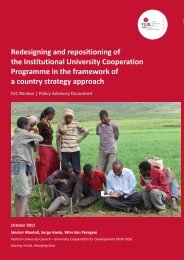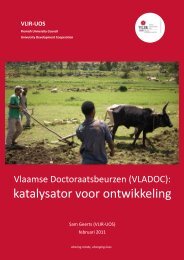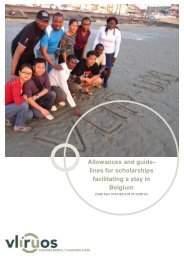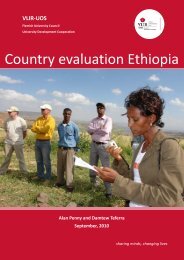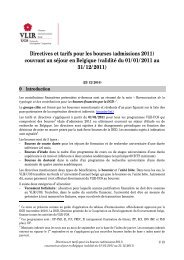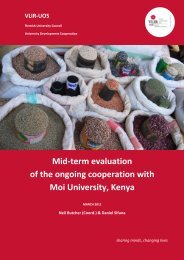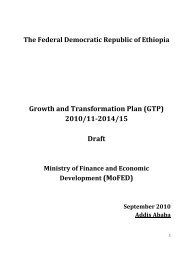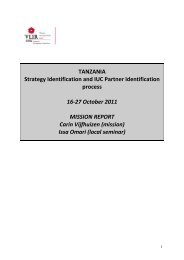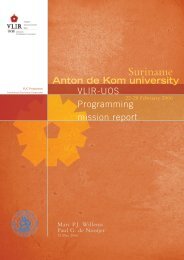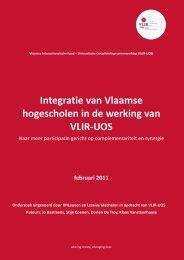Education Sector Development Program - VLIR-UOS
Education Sector Development Program - VLIR-UOS
Education Sector Development Program - VLIR-UOS
You also want an ePaper? Increase the reach of your titles
YUMPU automatically turns print PDFs into web optimized ePapers that Google loves.
<strong>Education</strong> <strong>Sector</strong> <strong>Development</strong> <strong>Program</strong> IV<br />
policy documents: a national policy framework, a<br />
strategic operation plan and guidelines.<br />
Main challenges<br />
• Average qualifications of teachers<br />
have gone down.<br />
• The role of the government<br />
and stakeholders in quality<br />
assurance of ECCE needs further<br />
clarification and strengthening.<br />
• Regions and woredas feel they<br />
did not receive sufficient guidance<br />
and support from the Ministry.<br />
2. Expected <strong>Program</strong> outcomes<br />
❚<br />
❚<br />
❚<br />
❚<br />
A coherent governance structure for<br />
Early Childhood Care and <strong>Education</strong><br />
(ECCE) established, in collaboration<br />
with other relevant ministries<br />
(Ministry of Health and Ministry<br />
of women’s Affairs) with a view to<br />
coordinating ECCE policies and<br />
ensuring mainstreaming of ECCE<br />
in all relevant sector policies and<br />
programs<br />
Government leadership and regulation<br />
in terms of teacher supervision and<br />
inspection, of teacher certification<br />
and training and ECCE curriculum<br />
strengthened<br />
Quality of ECCE services improved<br />
with special attention to children with<br />
special needs.<br />
Leading role of the Ministry<br />
strengthened for the integrated,<br />
inter-ministerial implementation<br />
of the ECCE Policy and Strategic<br />
Framework.<br />
Key outcome targets<br />
A national steering committee and regional<br />
and woreda councils and committees will be<br />
established.<br />
National guidelines on curriculum, teacher<br />
training and certification and teacher<br />
supervision will be completed.<br />
% of trained/certified teachers will increase<br />
from 37% to 60%<br />
coordinating, supporting and monitoring the<br />
involvement of other stakeholders.<br />
The strategies to be implemented under<br />
ESDP IV cover four main areas. Firstly,<br />
the government and the various relevant<br />
ministries will make efforts to mainstream<br />
ECCE. In this regard, the overall<br />
governance structure and the mandate<br />
and role of the various stakeholders will<br />
be clarified. As part of this, the ministry<br />
will help establishing a national steering<br />
committee, regional councils and woreda<br />
technical committees.<br />
Secondly, the Ministry will reinforce its role<br />
in regulating and monitoring the quality of<br />
ECCE delivery. This will take place through<br />
the development of a curriculum and setting<br />
standards for play and learning materials which<br />
promote child-centered teaching and the child’s<br />
holistic development. This will be ensured<br />
partly through the setting up of accreditation<br />
and certification systems of teacher training<br />
and teacher qualification applicable both for<br />
community /public and private ECCE centers<br />
which in turn will help assign qualified teachers<br />
required for the level .This will be enhanced<br />
through the design of an effective ECCE<br />
supervision and inspection policy. Strong linkage<br />
will be created with families and the community,<br />
NGOs, <strong>Development</strong> Partners and Ministries of<br />
Health and Women’s Affairs (these ministries<br />
are ECCE signatories of MOU with the Ministry<br />
of <strong>Education</strong>) and other relevant stake holders.<br />
Thirdly, the ministry will more directly support<br />
quality improvement. In collaboration with other<br />
stakeholders, teacher support materials will be<br />
prepared and made available to ECCE centers.<br />
An enabling environment for the training of ECCE<br />
teachers and the supervision of ECCE centers<br />
will be promoted.<br />
Fourthly, colleges of teacher education will give<br />
more attention to ECCE teacher training and<br />
development in their teacher training programs.<br />
An enabling environment<br />
for the training of<br />
ECCE teachers and the<br />
supervision of ECCE<br />
centers will be promoted.<br />
3. Policy and strategies<br />
While the government’s direct involvement in<br />
the provision of ECCE will remain limited, its<br />
role in maintaining the improvement of quality<br />
of ECCE and its governance through supervision<br />
and inspection will deepen during ESDP IV. The<br />
government’s role will be mainly one of promoting,<br />
17




